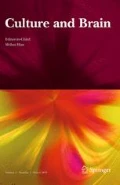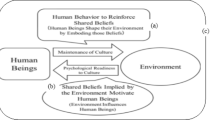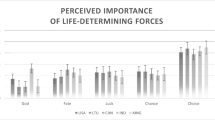Abstract
Dominant theories assume that moral judgments reflect the individual’s personal beliefs, but cross-cultural findings on morality suggest that people in collectivistic and tight cultures may rely on social expectations to evaluate morally relevant actions. Moreover, moral attitudes are flexible, and people may adapt moral values in line with what the members of the host culture value. In the current research, self-construal, tightness-looseness, and extrinsic moral motives (perceptions that moral acceptability of a given action is something that people are expected to go along with others) were investigated. Japan residents who had never been abroad (n = 73) and Japanese sojourners in individualistic and loose cultures (the United States, Canada, France, Germany, and Italy; n = 50) participated. Results showed that compared with Japan residents, Japanese sojourners reported lower extrinsic moral motives on morally relevant actions concerning communal values. Cultural tightness, but not self-construal, mediated the relationship between culture and extrinsic moral motives ratings. Among sojourners, assimilation and cultural tightness predicted higher extrinsic moral motives ratings, whereas length of residence negatively predicted the motives. These results show that people in tight cultures may make moral judgments based on what is perceived as socially appropriate, but not on what is personally important. Also, the research highlights the importance of considering the role of extrinsic moral motives in shaping moral judgments.

Similar content being viewed by others
References
Bardi, A., & Schwartz, S. H. (2003). Values and behavior: Strength and structure of relations. Personality and Social Psychology Bulletin, 29, 1207–1220. https://doi.org/10.1177/0146167203254602.
Barry, D. T. (2001). Development of a new scale for measuring acculturation: The East Asian Acculturation Measure (EAAM). Journal of Immigrant Health, 3, 193–197. https://doi.org/10.1023/A:1012227611547.
Berry, J. W., & Sam, D. L. (1997). Acculturation and adaptation. In J. W. Berry, M. H. Segall, & C. Kagitcibasi (Eds.), Handbook of cross-cultural psychology, social behaviour and applications (2nd ed., Vol. 3, pp. 291–326). Boston, MA: Allyn Bacon.
Chiu, C., Dweck, C. S., Tong, J. Y., & Fu, J. H. (1997). Implicit theories and concepts of morality. Journal of Personality and Social Psychology, 73, 923–940. https://doi.org/10.1037/0022-3514.73.5.923.
Cojuharenco, I., Shteynberg, G., Gelfand, M., & Schminke, M. (2012). Self-construal and unethical behavior. Journal of Business Ethics, 109, 447–461. https://doi.org/10.1007/s10551-01101139-8.
Conroy, M., Hess, R. D., Azuma, H., & Kashiwagi, K. (1980). Maternal strategies for regulating children’s behavior: Japanese and American families. Journal of Cross-Cultural Psychology, 11, 153–172. https://doi.org/10.1177/0022022180112002.
Fantini, A. E. (2000). A central concern: Developing intercultural competence. SIT occasional papers series, 1. Retrieved from http://www.sit.edu/publications/docs/competence.pdf.
Fritz, M. S., & MacKinnon, D. P. (2007). Required sample size to detect the mediated effect. Psychological Science, 18, 233–239. https://doi.org/10.1111/j.1467-9280.2007.01882.x.
Fukushima, M., Sharp, S., & Kobayashi, E. (2009). Bond to society, collectivism, and conformity: A comparative study of Japanese and American college students. Deviant Behavior, 30, 434–466. https://doi.org/10.1080/01639620802296212.
Gelfand, M. J., Raver, J. L., Nishii, L., Leslie, L. A., Lun, J., Lim, B. C., et al. (2011). Differences between tight and loose cultures: A 33-nation study. Science, 332, 1100–1104. https://doi.org/10.1126/science.1197754.
Gollwitzer, M., & Bȕcklein, K. (2007). Are “we” more punitive than “me”?: Self-construal styles, justice-related attitudes, and punitive judgments. Social Justice Research, 20, 457–478. https://doi.org/10.1007/s11211-007-0051-y.
Graham, J., Haidt, J., Koleva, S., Motyl, M., Iyer, R., Wojcik, S., et al. (2013). Moral foundations theory: The pragmatic validity of moral pluralism. Advances in Experimental Social Psychology, 47, 55–130. https://doi.org/10.1016/B978-0-12-407236-7.00002-4.
Güngör, D., Bornstein, M. H., De Leersnyder, J., Ceulemans, E., & Mesquita, B. (2013). Acculturation of personality: A three-culture study of Japanese, Japanese Americans, and European Americans. Journal of Cross-Cultural Psychology, 44, 701–718. https://doi.org/10.1177/0022022112470749.
Haidt, J. (2008). Morality. Perspectives on Psychological Science, 3, 65–72. https://doi.org/10.1111/j.1745-6916.2008.00063.x.
Haidt, J., Koller, S., & Dias, M. (1993). Affect, culture, and morality, or is it wrong to eat your dog? Journal of Personality and Social Psychology, 65, 613–628. https://doi.org/10.1037/0022-3514.65.4.613.
Hofstede, G. (2001). Culture’s consequences: Comparing values, behaviors, institutions, and organizations across nations. Thousand Oaks: Sage.
Honda, S., Ishimaru, A., Utsunomiya, S., Yamane, T., Oda, M., Sakamoto, K., et al. (2017). Considering the relation between the Haidt’s Moral Foundations Theory and Japanese morality through developing a new scale. Bulletin of the Faculty of Education, Yamaguchi University, 66, 95–106. (in Japanese).
Kitayama, S., & Markus, H. R. (1999). Yin and yang of the Japanese self: The cultural psychology of personality coherence. In D. Cervone & Y. Shoda (Eds.), The coherence of personality: Social cognitive bases of personality consistency, variability, and organization (pp. 242–302). New York: Guilford.
Kitayama, S., & Uskul, A. K. (2011). Culture, mind, and the brain: Current evidence and future directions. Annual Review of Psychology, 62, 419–449. https://doi.org/10.1146/annurev-psych-120709-145357.
Laham, S., Chopra, S., Lalljee, M., & Parkinson, B. (2009). Emotional and behavioural reactions to moral transgressions: Cross-cultural and individual variations in India and Britain. International Journal of Psychology, 45, 64–71. https://doi.org/10.1080/00207590902913434.
Levine, T. R., Bresnahan, M. J., Park, H. S., Lapinski, M. K., Wittenbaum, G. M., Shearman, S. M., et al. (2003). Self-construal scales lack validity. Human Communication Research, 29, 210–252.
Miller, J. G., Bersoff, D. M., & Harwood, R. L. (1990). Perceptions of social responsibilities in India and in the United States: Moral imperatives or personal decisions? Journal of Personality and Social Psychology, 58, 33–47. https://doi.org/10.1037/0022-3514.58.1.33.
Ministry of Foreign Affairs of Japan (2018). Annual report of statistics on Japanese nationals overseas. Retrieved from https://www.mofa.go.jp/mofaj/files/000368753.pdf.
Mrazek, A. J., Chiao, J. Y., Blizinsky, K. D., Lun, J., & Gelfand, M. J. (2013). The role of culture-gene coevolution in morality judgment: Examining the interplay between tightness-looseness and allelic variation of the serotonin transporter gene. Culture and Brain, 1(2–4), 100–117. https://doi.org/10.1007/s40167-013-0009-x.
Preacher, K. J., & Hayes, A. F. (2004). SPSS and SAS procedures for estimating indirect effects in simple mediation models. Behavior Research Methods, Instruments, & Computers, 36, 717–731. https://doi.org/10.3758/BF03206553.
Rozin, P., Lowery, L., Imada, S., & Haidt, J. (1999). The CAD triad hypothesis: A mapping between three moral emotions (contempt, anger, disgust) and three moral codes (community, autonomy, divinity). Journal of Personality and Social Psychology, 76, 574–586. https://doi.org/10.1111/1467-9280.00139.
Schwarz, N. (1990). Feelings as information: Informational and motivational functions of affective states. In R. M. Sorrentino & E. T. Higgins (Eds.), Handbook of motivation and cognition: Cognitive foundations of social psychology (Vol. 2, pp. 527–561). New York: Guilford Press.
Schwartz, S. H., Verkasalo, M., Antonovsky, A., & Sagiv, L. (1997). Value priorities and social desirability: Much substance, some style. British Journal of Social Psychology, 36, 3–18. https://doi.org/10.1111/j.2044-8309.1997.tb01115.x.
Shweder, R. A., Much, N. C., Mahapatra, M., & Park, L. (1997). The “big three” of morality (autonomy, community, and divinity), and the “big three” explanations of suffering. In A. Brandt & P. Rozin (Eds.), Morality and health (pp. 119–169). New York, NY: Routledge.
Singelis, T. M. (1994). The measurement of independent and interdependent self-construals. Personality and Social Psychology Bulletin, 20, 580–591. https://doi.org/10.1177/0146167294205014.
Takata, T. (2000). On the scale for measuring independent-interdependent view of self. Bulletin of Research Institute, Nara University, 8, 145–163. (in Japanese).
Uz, I. (2015). The index of cultural tightness and looseness among 68 countries. Journal of Cross-Cultural Psychology, 46, 319–335. https://doi.org/10.1177/0022022114563611.
Vauclair, C.-M., Fischer, R., Ferreira, M. C., Guerra, V., Hössler, U., Karabati, S., et al. (2015). What kinds of value motives guide people in their moral attitudes?: The role of personal and prescriptive values at the culture-level and individual-level. Journal of Cross-Cultural Psychology, 46, 211–228. https://doi.org/10.1177/0022022114557487.
Ward, C., & Rana-Deuba, A. (1999). Acculturation and adaptation revisited. Journal of Cross-Cultural Psychology, 30, 373–392. https://doi.org/10.1177/0022022199030004003.
Yuki, M. (2003). Intergroup comparison versus intragroup cooperation: A cross-cultural examination of social identity theory in North American and East Asian cultural contexts. Social Psychology Quarterly, 66, 166–183. https://doi.org/10.2307/1519846.
Funding
This research has been supported by Uehiro Foundation on Ethics and Education (H30, No. 3).
Author information
Authors and Affiliations
Corresponding author
Ethics declarations
Conflict of interest
The author(s) declared no conflicts of interest, regarding the research, authorship, and publication of this article.
Additional information
Publisher's Note
Springer Nature remains neutral with regard to jurisdictional claims in published maps and institutional affiliations.
Rights and permissions
About this article
Cite this article
Takamatsu, R. Culture and extrinsic moral motives: comparisons of Japan residents and Japanese sojourners in individualistic and loose countries. Cult. Brain 9, 112–127 (2021). https://doi.org/10.1007/s40167-020-00095-1
Accepted:
Published:
Issue Date:
DOI: https://doi.org/10.1007/s40167-020-00095-1




